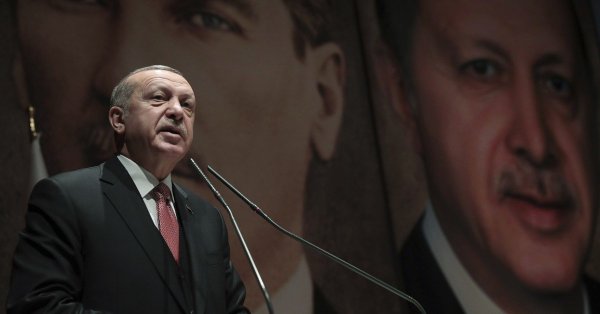By Michael Rubin
There is no longer any real debate about the nature of President Recep Tayyip Erdogan’s regime. This past year, Freedom House dropped Turkey’s ranking to “not free,” joining a club populated by the likes of Russia, Iran, North Korea, and Venezuela. In 2012, Reporters Without Borders described Turkey as the “world’s biggest prison for journalists” and their situation has since only gotten worse. Tax bodies audit any who dare donate to political opponents. Turkish prisons are filled to capacity with political prisoners. It seems that Erdogan has lived up to his cynical likening of democracy to a street car — something only to be ridden until the desired destination is reached.
A broad array of Turks who visit the United States and Europe speak of the fear and paranoia infusing Turkish society. Just as in the world’s most abusive autocratic regimes, Turks fear the wrong word or a whispered joke could lead to interrogation, arrest, or imprisonment. Just as in Cold War-era Communist states, a jealous neighbor or aggrieved businessman can file a false report and ruin lives.
Dictators may at first glance appear secure in their power but, while democrats awake every morning confident in the legitimacy and security of their tenure, dictators must rise each day realizing it could be their last: None ever expects the heart attack, assassination, or coup that will end their rule, but they can be assured one or the other will come.
Back to Erdogan: Almost 15 years after first assuming the premiership, the Turkish leader looks secure in power, even though he has only once received a majority vote and likely only then because his own appointees and supporters counted the ballots.
How might Erdogan’s tenure end? There are only four possibilities:
State Funeral
This is Erdogan’s preference. Arising out of poverty, he has now amassed a fortune worth billions of dollars and is loath to risk it by loosening his grasp on the reins of power. For all her careful efforts to project an image of pious religiosity, his wife Emine, too, has like former Argentine first lady Evita Peron, become addicted to luxury.
Accumulation of family wealth and the ability to humiliate his enemies foreign and domestic are not the only motivations shaping Erdogan’s quest for power. Sincere, even if intolerant, religious belief might be another factor. As Turkey nears its 100th anniversary, Erdogan seeks to inaugurate a second republic and to finally close the casket on Ataturk’s legacy.
Perhaps Erdogan’s greatest reason for remaining in power is to ensure his family legacy. While his Justice and Development Party, or AKP, was the vehicle he rode to power, he has now cast aside party stalwarts like former President Abdullah Gul and Foreign Minister Ahmet Davutoglu, both of whose whispered links to exiled cleric Fethullah Gulen could lead to their imprisonment at any time, and worked to promote family in their place. He has positioned his sons Ahmet and Bilal to take charge of the family’s multibillion dollar fortune, and maneuvered son-in-law Berat Albayrak, who currently serves as Finance Minister, to succeed him. What Erdogan forgets, however, is that it was Egyptian President Hosni Mubarak’s efforts to put son Gamal in powerthat led not only the masses but the military elites to turn on him and to enable his ouster. Regardless, Erdogan underestimates the knives wielded by AKP members shunted aside which lie in wait for Ahmet, Bilal, and Berat when Erdogan is gone.
Exile
Driving Erdogan’s paranoia is an understanding that he is not as secure as he would like to be. Turkey is a pressure cooker, and his security forces are the lid. But with each arrest, confiscation, and purge and looming economic downturn, the pressure is building. It may only be a matter of time until there is an explosion. Erdogan likes to condemn the 2013 ouster in Egypt of Mohamed Morsi, the first elected Muslim Brotherhood president, but he ignores the real story: In the course of a single year, the polarizing and increasingly ideological Morsi managed to turn the support of millions of ordinary Egyptians against him. Critics of President Abdul Fatteh el-Sisi may call what transpired a coup while his supporters may say it is a revolution. Whatever the semantics, one thing is clear: Sisi could not have attained power had not Morsi first lost the support of the people.
If the Turkish people rise up, what will Erdogan do? His best option may be to flee into exile. Ugandan dictator Idi Amin chose Saudi exile. So too did former Tunisian strongman Zine El Abidine Ben Ali. Ukrainian leader Viktor Yanukovych chose Moscow, and former Gambian president Yahya Jammeh chose Equatorial Guinea. Just as late Libyan leader Muammar Qadhafi found he had no friends, Erdogan’s erratic behavior may limit his options. Erdogan’s embrace of the Muslim Brotherhood means Saudi Arabia is off-the-table. Nor is Russia a good bet. For Vladimir Putin, Erdogan is useful but ultimately a plaything in efforts to annoy the West. When Erdogan is no longer useful, Putin will discard him like a cat discards the carcass of a rat. The Maduro regime in Venezuela may not last much longer. That leaves Qatar or Azerbaijan. If Erdogan has forethought, he will buy real estate in one or the other before his successor or his enemies in the international community freeze his many accounts.
Imprisonment
Dictators often delude themselves into thinking they can recover power, even when the tide starts to turn against them. Former Serbian President Slobodan Milosevic died in prison. Former Iraqi President Saddam Hussein pushed aside an offer of a luxurious Dubai exile and stayed one day too long in his palace. As American tanks closed in on Baghdad, he went into hiding only to be fished out of a spider hole. He spent his last years in prison, attending trial for his crimes, until he finally drew his last breaths on the gallows. Hosni Mubarak also moved from palace to prison, though he later received a pardon.
If public anger erupts and regime change comes to Turkey, prosecutors can take their pick of crimes with which to charge Erdogan. When elected prime minister, there were already pending corruption files dating to his time as Istanbul mayor. His accumulation of vast wealth has no legal explanation. His own AKP colleagues have testified to his foreign bank accounts. While he dismisses leaked telephone recordings as fabrications, no intelligence analyst shares such an assessment, nor does it explain his panic when he believed anti-corruption police might raid his house. Subsequent documents only augment the tale of money laundering and diversion. His destruction of Kurdish towns like Cizre, Nusaybin, Sur, and Sirnak likely constitute crimes against humanity.
In short, should Erdogan stay too long against the backdrop of civil unrest, he may find himself facing decades in prison, if not worse.
Execution
Erdogan would neither be the first Turkish leader imprisoned nor, should his critics seek vengeance and the justice system allow, would he be the first to be executed. In 1950, the Democrat Party’s Adnan Menderes became prime minister after the country’s first free elections. He continued to run the government for the next 10 years, presiding not only over Turkey’s entrance into NATO but also over unprecedented economic growth. In 1960, however, against the backdrop of Cold War suspicions about his leftism and tolerance toward Islam in public life, the Turkish military led a coup and ousted and imprisoned him. Eventually, a court found Menderes guilty of embezzlement, violating the constitution, and ordering a pogrom in Istanbul which cost the lives of several dozen Greek citizens of Turkey. On Sept. 17, 1961, the Turkish junta hanged him.
Neither the coup nor the hanging was justified in Menderes’ case. While Turkish historians often put protection of the Turkey’s legacy above truth, even they have come around to see the injustice in Menderes’ fate. In 1990, the Turkish parliament not only pardoned Menderes, but allowed construction of a mausoleum in his honor.
While Menderes’ execution scarred Turkey, it also set a precedent. Where Menderes was innocent, Erdogan is, in most cases, guilty. While Menderes was in many ways a martyr, there is ample precedent for others who have engaged in ethnic cleansing, war crimes, terror sponsorship, and mass corruption to pay the ultimate price. Human Rights Watch and other anti-death-penalty organizations may complain, but they often subordinate principles to politics. For HRW, it is simply more lucrative to bash Israel than waste much time on Erdogan. That does not mean Erdogan’s execution would be wise — to transform the Turkish leader into a martyr would condemn a new generation of Turkish politicians to face the same polarization and unrest that the last generations have.
Too often in the Middle East and Turkey, especially in unfree societies, professors, press, and politicos confuse analysis and advocacy. Some may react negatively to voicing any scenarios which do not conform to the regime’s ambitions. But fact has a troubling way of interfering in fantasy. A look past Erdogan’s immediate horizon suggests his future is not bright and that humiliation and justice could, in an instant, replace the luxury and power to which Erdogan and his family have become accustomed.
Michael Rubin (@Mrubin1971) is a contributor to the Washington Examiner’s Beltway Confidential blog. He is a resident scholar at the American Enterprise Institute and a former Pentagon official.
source: Washington Examiner



